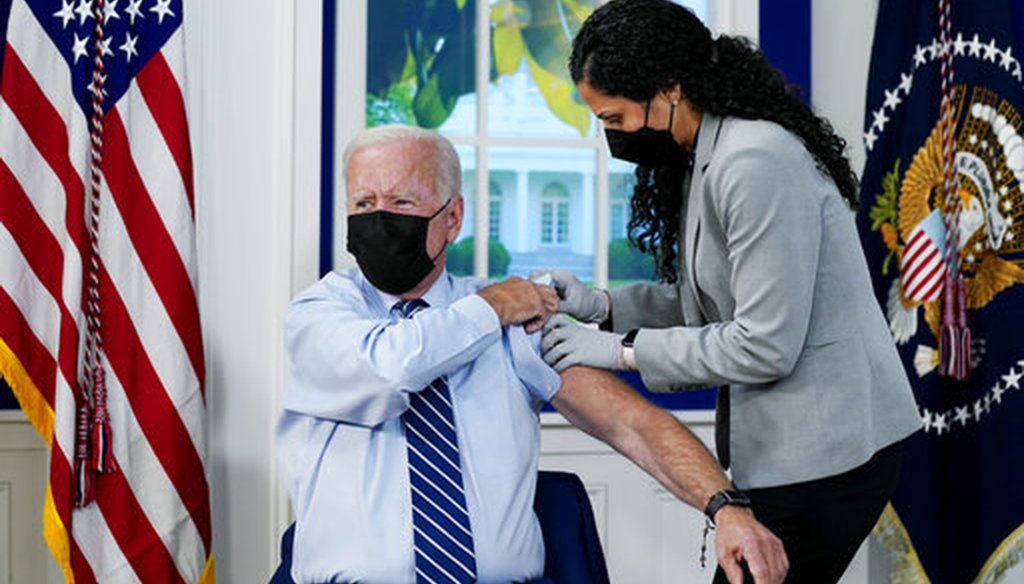

Our only agenda is to publish the truth so you can be an informed participant in democracy.
We need your help.


President Joe Biden receives a COVID-19 booster shot on Sept. 27, 2021 (AP)
The effectiveness of COVID-19 vaccines is shown in the higher infection rates, spread, hospitalization and death among unvaccinated people.
It’s common to give boosters to maintain or lengthen the protection provided by an initial vaccination.
A viral image claimed that COVID-19 vaccines are a "failed product" and, therefore, the vaccines’ booster shots are more of the same.
"There is no such thing as a booster," read text in an image shared on Instagram. "There is a failed product that is sometimes used again in hopes of a different outcome, which is the definition of insanity."
The image was flagged as part of Facebook’s efforts to combat false news and misinformation on its News Feed. (Read more about our partnership with Facebook.)
No vaccine is 100% effective. And while vaccines have not eradicated COVID-19, they have provided significant protection. The aim of booster shots is to extend the protection the vaccines provide. Other vaccines, such as the tetanus vaccine, come with standard timetables for recommended boosters.
One way to measure the vaccines’ success is the greater impact COVID-19 has had on the unvaccinated. Here’s a look, based on our past fact-checks.
The federal Centers for Disease Control and Prevention reported in September that the range of COVID-19 vaccine effectiveness remained high in the United States, even though it had decreased since the onset in late June of the delta variant, which the agency said is more than twice as contagious as previous variants. The effectiveness against infection ranged from 39% to 84%, and against hospitalization ranged from 75% to 95%.
A study in the Netherlands published in August said that the COVID-19 vaccines not only protect the vaccinated person, "but also offer protection against transmission to close contacts."
A study led by University of Oxford researchers that was posted Oct. 15 found among cases in England that vaccinated people who get breakthrough infections are less likely than unvaccinated people to infect others with the delta variant.
A study in China published in August also found that the unvaccinated were more likely to spread infection. A third study, done in Singapore and published in July, found that vaccination is associated with faster decline in viral load, a possible indicator of declining infectiousness. None of the studies had been peer reviewed.
The alpha, beta, gamma and delta variants were first detected in unvaccinated populations. Most variants were detected before vaccines were approved for use. Studies show that unvaccinated people are far more likely to spread the delta variant than vaccinated people.
In September, the CDC analyzed vaccine effectiveness across 13 U.S. jurisdictions from April 4 to July 17 and matched that data to vaccine registries from those areas. It found that after delta became dominant, unvaccinated people were five times more likely to be infected than fully vaccinated people, and more than 10 times more likely to be hospitalized or die.
As of Oct. 18, more than 189 million people in the United States had been fully vaccinated against COVID-19, according to the latest CDC statistics. Of them, 41,127 got COVID-19 and were hospitalized or died. That is 0.021%. About 85% of the deaths and 66% of the hospitalizations were among those 65 or older.
It’s also important to understand that boosters are a standard part of administering vaccines generally, since the immunity they provide can wane over time. For example, the CDC recommends that adults get a Tdap vaccine once if they did not receive it as an adolescent to protect against pertussis (whooping cough), and then a Td (tetanus, diphtheria) or Tdap booster shot every 10 years.
An initial vaccine "educates your body's immune system about what's in it, building immunity just as a natural infection would but without the disease," according to Dr. Suzanne Cassel, an immunologist at the Cedars-Sinai healthcare organization. "Booster shots strengthen or maintain those immune responses."
An Instagram post read, "There is no such thing as a booster. There is a failed product that is sometimes used again in hopes of a different outcome."
Boosters are a standard means of extending protection that a vaccine provides. No vaccine is 100% effective but the vaccines against COVID-19 have been proven to be quite effective at staving off serious infection and death.
We rate the post False.
Instagram, post, Oct. 27, 2021
PolitiFact, "Key threat to unvaccinated people is other unvaccinated people," Oct. 27, 2021
PolitiFact, "Safer to be unvaccinated against COVID-19? In several ways, that’s False," Aug. 4, 2021
PolitiFact, "As more get vaccinated, spread and severity of COVID-19 worse among unvaccinated," Sept. 20, 2021
PolitiFact, "Evidence shows that COVID-19 variants are largely spread among unvaccinated people," Aug. 25, 2021
PolitiFact, "Unvaccinated people ‘not dead or sick’? False. COVID-19 is hitting them hard," Aug. 9, 2021
PolitiFact, "COVID-19 booster shots: What we know so far," Sept. 13, 2021
Cedars Sinai, "Understanding Vaccine Boosters," July 26, 2021
Centers for Disease Control and Prevention, "What Vaccines are Recommended for You," Nov. 21, 2019
In a world of wild talk and fake news, help us stand up for the facts.
